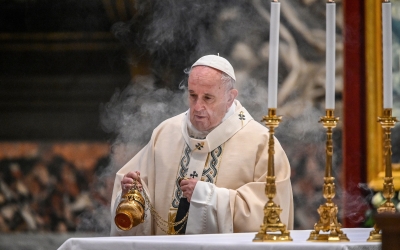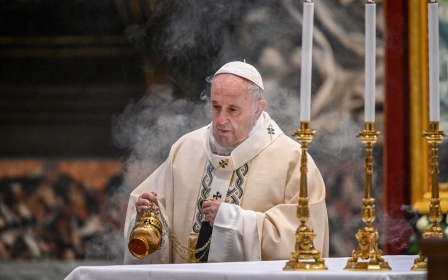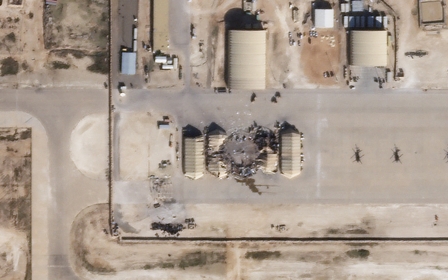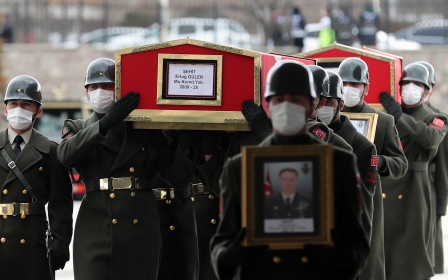Iraq: Christians in Iraq's devastated Qaraqosh await Pope Francis's visit
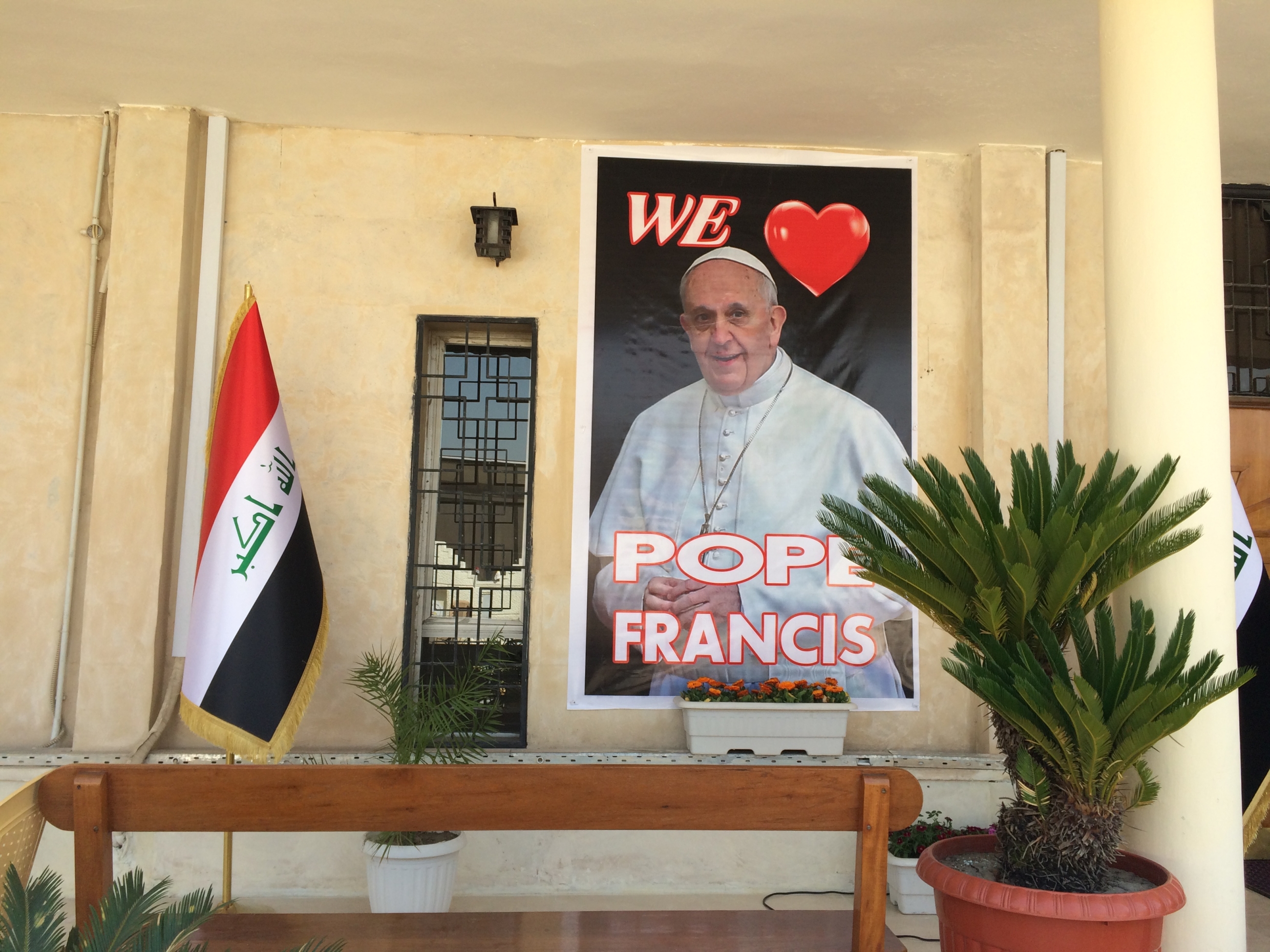
In the Christian-majority, northern Iraqi town of Qaraqosh, a community uprooted by the Islamic State (IS) group in 2014 is now preparing for an event that, just a few years ago, seemed unimaginable: a visit by His Holiness Pope Francis.
When IS entered Qaraqosh, which lies 30km from Mosul, the town's entire population - save two elderly ladies - fled to neighbouring Iraqi Kurdistan, leaving militants to a campaign of looting and destruction. Churches were desecrated, steeples toppled, statues smashed; Christian homes were looted and set ablaze.
After liberation by Iraqi forces in 2016, IS graffiti marred walls across the ruined and deserted town, while a church hall used as an IS bomb-making facility was still full of chemicals, explosive components and IS stencils.
With only around half the town’s former residents having returned, reconstruction has been slow and patchy. Some homes have been rebuilt and several churches restored, largely relying on foreign aid.
New MEE newsletter: Jerusalem Dispatch
Sign up to get the latest insights and analysis on Israel-Palestine, alongside Turkey Unpacked and other MEE newsletters
But the community is now abuzz with preparations for the pope’s visit. Roads are being hastily patched up and posters depicting the pope and his sayings are hung from the town’s lamp posts.
The Church of the Immaculate Conception - Qaraqosh’s largest, which only reopened last August - is also getting a makeover. Choir children practise there daily.
The church was looted, trashed and burned by IS, who made a pyre of religious texts and hymnbooks in the courtyard. When MEE first visited in November 2016, after liberation, the church was a blackened hollow. The courtyard - also used as a firing range for militants to practise their shooting skills - was carpeted with bullet casings and fragments of smashed statues.
Above bullet-ridden mannequins strewn across the floor, courtyard pillars had been so consistently shot that nothing remained but their metal reinforcements.
'A missionary people'
The announcement of the pope’s unexpected visit to Iraq, a country that has endured two decades of security, political and sectarian issues, delighted Iraq’s Christian minority, who hope that the trip will draw the world’s attention to their plight.
“The visit of the Holy Father comes as a real sign of hope that we will not be completely forgotten by the world,” Chaldean Catholic Archbishop of Erbil Bashar Warda told MEE.
He described the remaining Christians of Iraq as “essentially a missionary people”, due to the large drop in numbers over the past two decades. Estimates put the number of Christians in Iraq at around 250,000, down from an estimated 1.5 million before the 2003 US-led invasion.
Off the record, two senior members of the country’s Christian community told MEE on separate occasions that they believe the real number to be fewer than 200,000.
“Our mission is to preserve a true Christian witness in Iraq. The visit of Pope Francis can be a rock for us in building this mission,” said Archbishop Warda.
“As for the current situation of the Christians and religious minorities in Iraq, the people have been so abused and persecuted that what they need and hope for is for the violence to stop, and corruption from foreign influences and corrupt governments to end.”
The pope’s schedule is ambitious, encompassing the south - where he is expected to meet with Ali al-Sistani, Iraq's highest Shia religious authority - and Erbil in Iraqi Kurdistan, as well as Mosul and Baghdad.
"It’s a feeling full of happiness and holiness to know about the visit of Pope Francis to my country Iraq and, God willing, it will bring changes for the lives of Christians here and across the Middle East," said Sinan Wadeea Eskander, 38, a biochemistry graduate who is currently a stay-at-home mother-of-two. "It will bring big support - not financial support but spiritual and emotional support.
“The situation here is terrible for Christians," she added. "Unfortunately, since 2003 until now there has been mass displacement of Christians. We have also been abused, kidnapped, killed, and have had our human rights undermined and our homes and land seized.”
A Shia Muslim family renting a large house in downtown Baghdad from a Christian family who fled abroad also spoke of attempted land seizures. On two separate occasions, armed men came to the house, asking who lived there and who owned it.
“I think they only left us alone because we were a Muslim family… otherwise I believe they would have taken the whole property,” a family member told MEE, speaking on condition of anonymity.
Decades of sectarianism
In a press conference on Tuesday, Iraqi Minister of Culture Dr Hassan Nadhem described Iraqi Christians as “the original people of this soil”, adding: “The pope’s visit represents an important step in spreading worldwide awareness that Iraqi Christians are part of this country’s rich cultural diversity."
But the road towards mutual religious respect, in a country where some schoolchildren are taught that Christians, among other Iraqi minorities, are "infidels", is likely to be a long one.
The 2003 US-led invasion of Iraq soured relations between Sunni and Shia Muslims, as well as other minorities who had lived side by side for centuries. Almost two decades of sectarianism have done much damage.
For those who have settled abroad, even after the defeat of IS, Iraq currently offers few reasons to return. Legal counsel for the Archdiocese of Erbil, Steven Rasche, described the situation as “almost the same as right after IS”, citing severely damaged towns, and lost homes, livelihoods and savings, with few lucrative job opportunities.
Just two years ago, on a visit to London, Archbishop Warda warned that "Christianity in Iraq, one of the oldest churches, if not the oldest church in the world, is perilously close to extinction”, adding: “Those of us who remain must be ready to face martyrdom.”
'The visit of the Holy Father comes as a real sign of hope that we will not be completely forgotten by the world'
- Bashar Warda, Chaldean Catholic Archbishop of Erbil
Reema Rafed, the only member of her family still living in Iraq, hopes Pope Francis’s visit will bring changes for the better for Iraqi Christians. But the problems, she admits, run very deep.
“Christians in Iraq are badly treated, especially after the explosion of the Mother of Salvation Church in Baghdad (a 2010 attack by Islamic hardliners that left 58 dead and 78 injured). Then there was IS and the mass displacement of people,” she told MEE.
For Rafed, another challenge is that Iraq’s Christians lack any meaningful political representation. Those holding political positions have so far failed, she said, to benefit any of Iraq’s Christian denominations.
“We want Iraq to respect Christians… that is a key reason for the pope’s visit, to ensure Christians are respected and given their rights,” insisted Rami Esa Saqat, 27, an English teacher and poet from Qaraqosh.
Amid the town's preparations - including a group of women hand-embroidering a traditional scarf as a gift for Pope Francis - he has been inspired to write a poem in English commemorating the visit, though he knows it may not be possible to present it in person.
An extract shared with MEE depicts the sense of tragedy that has come to underscore the lives of many Iraqi Christians:
God, so much is for us your love
That's always like a white dove,
Hovering in the sky and our heads above,
And now your love and endless blessing
Are embodied in Pope Francis's visit, dressing
And curing our wounds which are deep and depressing.
Despite the challenges they face, some Iraqi Christians nurture quiet optimism for the future.
"For sure we will stay here because it is our country and we hope to live in peace and love with all our Iraqi brothers and sisters, from all the different religions, and to live as one,” said Eskander, who senses a recent shift in Iraqi thinking about Christians.
This may be due to the forthcoming papal visit, she says, or because, after IS, there has been a resurgence of interest in history and nationality.
“Now there is a kind of understanding that we, as Assyrian Christians, are actually the original people of the country, have the right to live here and also the right to defend our rights here,” she said, adding that many ordinary Iraqis were starting to talk about this, not only the country’s Christians.
“My message to the world, and from the depths of my heart, is that I would like you to pray for my injured country and pray for things to return to normal, like before 2003. Actually, even better than before.
"If God is willing, the pope’s visit will be a blessing to all Christians in Iraq and will help make this hope our reality.”
This article is available in French on Middle East Eye French edition.
Middle East Eye delivers independent and unrivalled coverage and analysis of the Middle East, North Africa and beyond. To learn more about republishing this content and the associated fees, please fill out this form. More about MEE can be found here.


